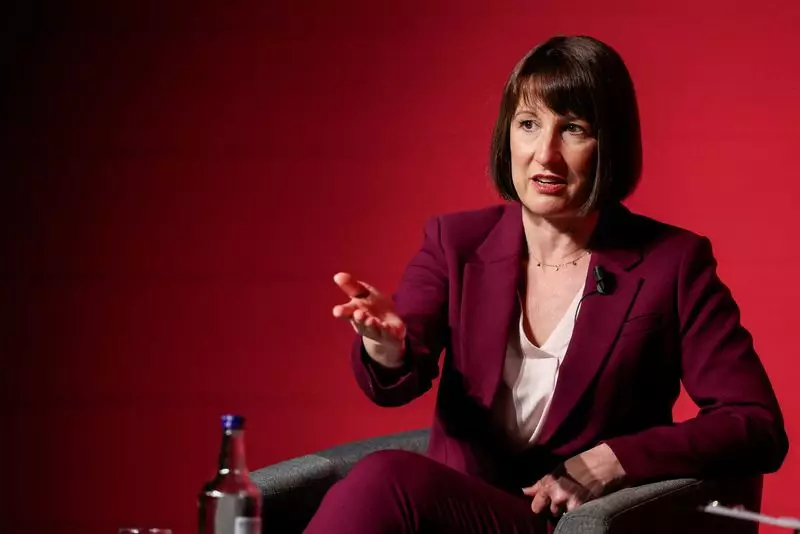As the newly appointed British finance minister, Rachel Reeves finds herself at the forefront of a challenging economic landscape, characterized by rising public debt and the lingering effects of previous austerity measures. The upcoming budget presentation set for October 30 marks a pivotal moment for the Labour government under Prime Minister Keir Starmer. In a nation where public debt stands at approximately 100% of its annual GDP, Reeves has emphasized the need for responsible borrowing practices, suggesting the introduction of “guardrails” aimed at managing additional investment-related debt.
This cautious approach is not merely a safeguard against reckless spending; it represents a broader shift in the government’s economic philosophy. Reeves’ intention to balance financial prudence with necessary investments speaks to the desire to stimulate economic growth through infrastructure and sustainable practices, including the transition to a net-zero economy. The dual focus on fiscal responsibility and growth sets the stage for a budgetary plan that has the potential to redefine the United Kingdom’s economic trajectory.
One of the primary challenges facing Reeves is the task of restoring faith among investors, who are wary of the implications of increased borrowing. The rise in British gilt yields relative to other government bonds underscores these anxieties, rooted in a fiscal history marked by fiscal miscalculations and hasty decisions. The reference to previous government’s initiatives, particularly those from former Prime Minister Liz Truss, serves as a poignant reminder of the market’s vulnerabilities. Truss’ ill-fated tax cuts, which were criticized for lacking funding and coherence, resulted in turmoil and a swift political fallout, ultimately leading to her resignation.
In contrast, Reeves aims to establish a transparent framework for her fiscal policy. By involving institutions such as the Office for Budget Responsibility (OBR) and the National Audit Office (NAO) in policy evaluations, she seeks to create a sense of accountability and thorough oversight that was glaringly absent in the past. This collaborative approach is not only strategic but necessary, as it lays the groundwork for public and investor confidence in the government’s commitment to responsible financial governance.
Reeves’ vision for the UK economy hinges on the concept of long-term investment serving as a catalyst for sustainable growth. By advocating for an amendment to the government’s fiscal debt rule to consider the long-term benefits of investments, she acknowledges a crucial economic principle: that productive spending can yield substantial returns over time. However, the precise scale of this increased spending remains undetermined, as she has chosen to shroud her fiscal plans in some ambiguity.
The focus on infrastructure and green energy is both timely and necessary. With the world grappling with climate change and the urgent need for sustainable economic practices, the Labour government’s commitment to these areas aligns with contemporary global priorities. Such significant investments could pave the way for job creation, improved public services, and enhanced overall economic resilience. To achieve this vision, however, balancing the scale of investment against the realities of public finances will be paramount.
Moving Beyond Austerity
A key message from Reeves is her firm stance against a return to austerity—a position that resonates with the public’s fatigue over previous stringent measures. By asserting that “there won’t be a return to austerity,” she aims to foster a new narrative around fiscal policy, one that prioritizes necessity and progress over fear and limitation. This is an ambitious undertaking, as it requires a complete re-evaluation of past financial practices, and an honest assessment of both spending pressures and tax revenues.
Reeves’ determination to “wipe the slate clean” and engage in a transparent dialogue about the fiscal landscape speaks to her commitment to progressive governance. The nuanced approach to fiscal policy that includes revising existing rules not only reflects a desire for change but also acknowledges the complex interplay between economic investments and overall fiscal health.
With the clock ticking down to Reeves’ first budget announcement, all eyes will be on how she navigates the delicate balance between fiscal responsibility and necessary investment. The strategies employed may serve as a roadmap for the future, not just for the current government but for subsequent administrations as well. By embedding prudence within a framework geared towards long-term growth, Reeves’ budgetary approach could redefine the British economic narrative and re-establish the UK’s position in the global marketplace. In a post-austerity era, the implications of her policies could be far-reaching, resonating through sectors, communities, and ultimately, the entire nation’s economic fabric.

